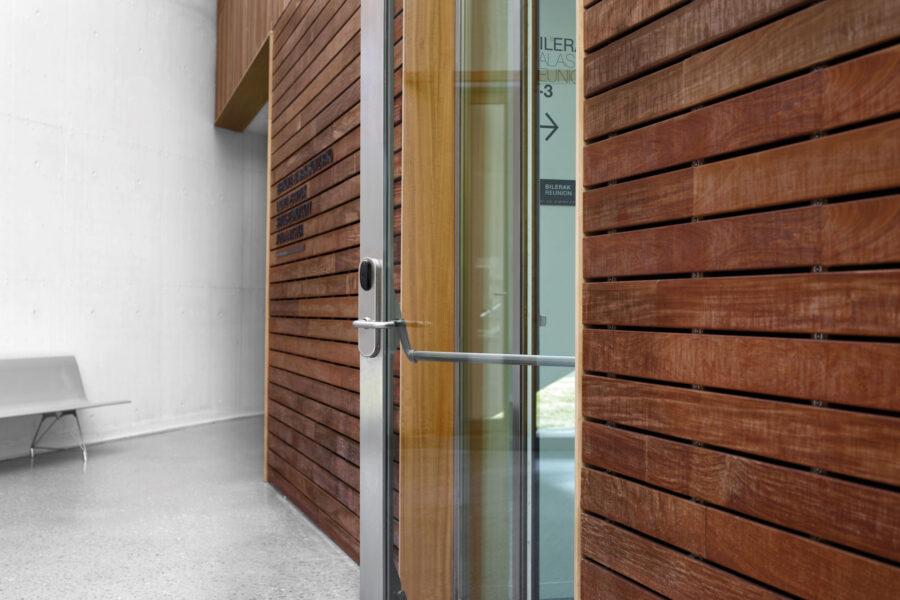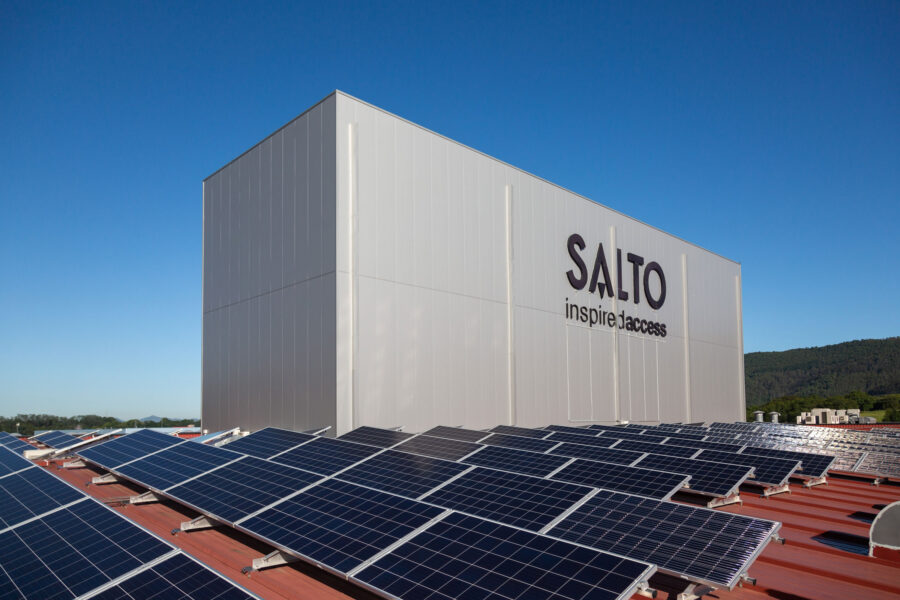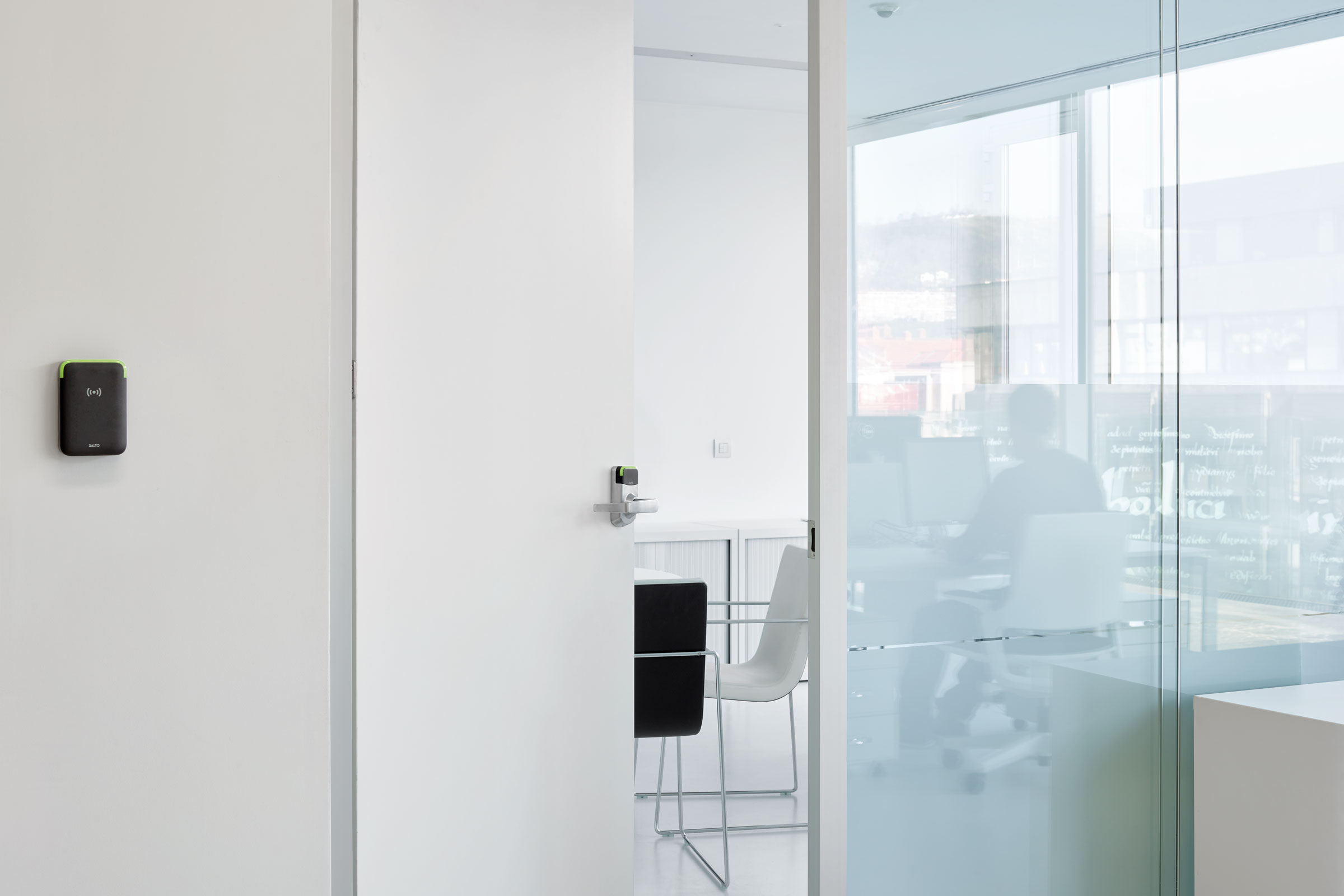Story at a glance:
- Controlled access to buildings of all types continues to evolve from brass key and disposable card systems.
- SALTO Systems takes security beyond simple locks; the company’s commitment to environmentalism drives efficiencies that lower customers’ carbon footprint as well.
- The future of buildings means the future of secured access systems need to keep pace.
It may surprise some that in the conversation about controlled access—that is, how buildings and occupant security are managed by locks and keys—sustainability is a priority. What do the small devices we barely see have to do with carbon, pollution, or climate change?
It helps to consider first what’s new in locks and security. Modern secured access has redefined what locks and keys look like, how they function, and how they are made. Brass keys that turn a cartridge have been fading from doors for a generation. Fobs and card keys in hotels and corporate settings are common. But moving into the more advanced realm are SALTO Systems, which use wireless, electronic technologies that manage access to multiple sites from a single, flexible platform. From sourcing to manufacturing to product operations, SALTO pursues the greenest methods possible.
Designing the Future
The company designed its first data-on-card technology and an advanced battery-operated wireless electronic smart door lock range in 2001. With about a quarter of corporate staff dedicated to research and development, the company’s products have continued to evolve since.
These sophisticated systems run on electricity, but even with the considerable degree of resources SALTO uses in R&D, the company has minimized electricity consumption while eliminating the waste that disposable plastic cards, fobs, and brass keys would generate.
“Our goal was ultra-low power consumptions,” says Colin DePree, who oversees North American sales strategies at SALTO. Most of the company’s locks are powered by simple alkaline batteries—no power-source wiring required at installation—so the goal is to maximize the length of time the locks can operate before a battery change is required. “We measure battery use in cycles or unlocks. The earlier products would get 40,000 to 60,000 cycles per battery. The current models now get 160,000 to 210,000 cycles.” In the near future some locking solutions may not require batteries at all, but will operate instead by harvesting power wirelessly from a user’s cell phone battery.
SALTO in Action

SALTO Systems offers a scalable, flexible cloud-based smart access control solution with best-in-class real-time capabilities. Photo courtesy of SALTO Systems
Multiply those kinds of results over the number of SALTO’s more than 40,000 projects in operation globally. These encompass 5 million equipped access points and 40 million daily users—transforming controlled access on a large scale while providing distinct sustainability benefits to customers.
For example, Princeton University, with 1,000 faculty, 7,500 students, and 3,200 doors, needed to improve upon its brass-key locks. A working group of more than two-dozen people spent more than a year searching for a better system for their security when they found the smart-card SALTO system. It was installed with minimal disruption to the campus dorms and academic and administration buildings—taking on-campus security and sustainability to a new level.
SALTO Systems offers a scalable, flexible cloud-based smart access control solution with best-in-class real-time capabilities.
A multifamily residential development in Calgary is another example. Across nine properties with more than 2,300 residents and 1,400 doors, a better solution was needed for doors that range from glass to aluminum and standard apartment front doors, including on gyms, parking areas, and external entry doors that face temperatures as low as -50ºF in winter. The developers, who are also long-term owners of the facilities, chose a SALTO system for its ongoing support as well as its commitment to sustainability. The specific technologies used are wire-free, operating on a smart-locking platform with web-based software.
In these and other installations the owners and users of the secured access systems have reduced use of power and other resources, generating almost no waste with a smart system that enhances security across the board. They also get the benefit of far lower embodied carbon in the instruments due to the sustainability measures taken in SALTO’s sourcing and manufacturing process.
Sustainability, Inside & Out

SALTO uses 100% renewable energy in its Spain manufacturing and administrative headquarters, thanks to an array of solar PV panels plus offsite renewable energy sourcing. Photo courtesy of SALTO Systems
That mission of sustainability includes SALTO’s use of 100% renewable energy in its own Oiartzun, Spain manufacturing and administrative headquarters. They accomplish this with an array of solar photovoltaic panels plus offsite renewable energy sourcing, achieving 100% carbon neutrality in line with its ISO 14001 certification.
At SALTO raw materials are sourced as close to the facility as possible, ideally within 100 kilometers. The 650 employees at their Spain facility are incentivized to carpool, travel by public transportation, or bike. (Fun fact: the Tour de France rolled directly by the company’s Basque region facility in July 2023.)
This ethos extends to every facet and function of the company. “The team responsible for new product launches has been trained on eco-design and the circular economy in order to integrate these into the launch process,” according to the company’s 2022 Sustainability Report.
Why so green in a product category that is perhaps less scrutinized than many other industries? “The original founders are from Oiartzun,” DePree says. “This is a beautiful place. They are oriented to the local economy and environment.”
The company is privately held by those same people, perhaps giving them a leg up on making decisions that look at the longer-range impact of their work. Environmentalism is embedded in the company’s published core values, written to help meet the United Nation’s 2030 Agenda for Sustainable Development.
Forward-Thinking
Company leadership layers those environmental concerns with the pragmatic realities of what their customers need. For example, in complex buildings and campuses the types of doors and functions behind those doors often require different types of security. That means different locking systems are necessary within the same development. SALTO Systems can accommodate that.
And as actual building construction and real estate design evolves, SALTO develops systems to accommodate such things as well. DePree describes a trend toward modular construction, often built offsite, where walls and layouts are designed to be moved according to changing occupant needs. “We design it so the locks do not need to be changed,” he says. “Space has to be flexible to changing businesses and changing functions. There should be no need to replace a locking system.”
The company leadership studies all new trends in how buildings are built and used, including in student housing and co-working facilities. “We work to complete the circle,” DePree says, referring to the cradle-to-cradle philosophy. “This is a focus on longevity, including about the speed of technological advances and making software ‘backward compatible.’” By this he means using future software with existing locks, negating the need for new physical components. The company also incentivizes customers to recycle old locks and has a research foundation that looks for ways to reuse more than recycle those materials.
To the uninitiated, door locks and latches might seem like a small part of the reduce-reuse-recycle equation. But to users of SALTO Systems secured access systems, it’s a much bigger deal with meaningful impact.

